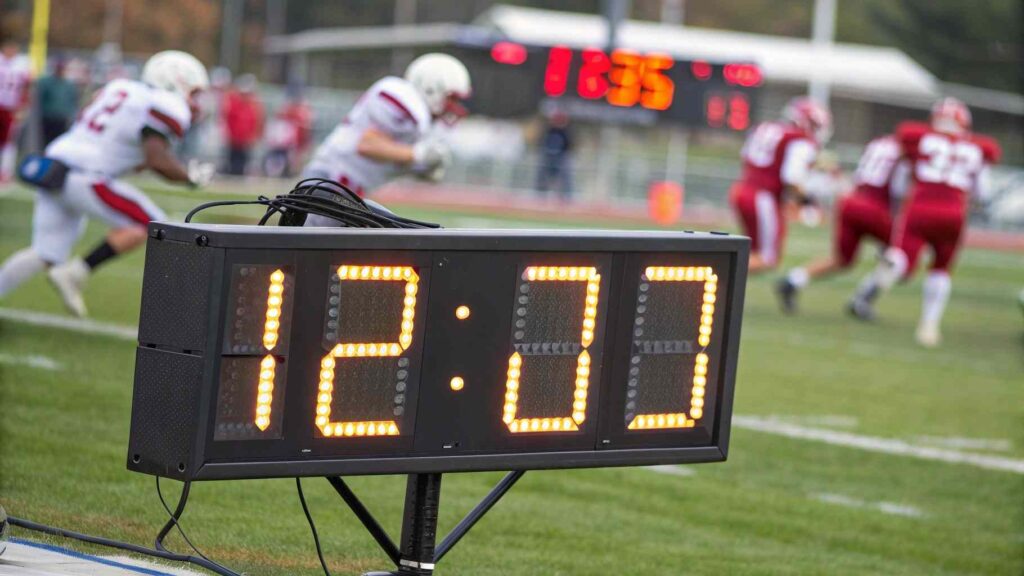
American football games last 2–4 hours, depending on level (high school to NFL). Soccer matches take 1–2 hours. Stoppages, timeouts, and overtime can extend durations. Plan accordingly!
Football is super fun to watch, but how long do games really last? Whether you love American football or soccer, knowing the game’s length helps you plan your day. This guide explains how long different football games take, why they vary, and tips to enjoy them. We’ve added more details and kept it simple for everyone to understand!
What Is a Football Game?
Football can mean two sports:
- American Football: Popular in the USA, played with an oval ball, lots of stops, and big plays (like in the NFL).
- Soccer: Called football everywhere else, played with a round ball, continuous action, and goals (like in the World Cup).
Each has different rules, so their game times differ. Let’s break it down!
American Football Game Length

NFL Games (Professional)
NFL games have four 15-minute quarters, making 60 minutes of play. But the game takes longer because of stops, breaks, and ads.
- Game time: 60 minutes.
- Real time: About 3 to 3.5 hours.
- Halftime: 12–15 minutes (up to 30 minutes for big events like the Super Bowl with cool performances).
- Overtime: If the score is tied, overtime adds 10–15 minutes. Sudden-death rules can make it shorter.
- Breaks: Lots of timeouts and TV commercials (2–3 minutes each) stretch the game.
College Football (NCAA)
College games also have four 15-minute quarters, but they feel longer because:
- The clock stops more often (like after first downs or out-of-bounds plays).
- Halftime is longer, often 15–20 minutes with band shows.
- Game time: 60 minutes.
- Real time: About 3.5 to 4 hours.
- Overtime: Tied games can add 15–30 minutes with unique rules (each team gets a chance to score).
High School Football
High school games are shorter with 12-minute quarters, totaling 48 minutes of play.
- Game time: 48 minutes.
- Real time: About 2 to 2.5 hours.
- Halftime: 10–15 minutes, often with a quick band or cheer performance.
- Overtime: Rare, but can add 10–15 minutes.
Youth Football
Kids’ games are even shorter to keep it fun and safe:
- Game time: 32–40 minutes (8–10-minute quarters).
- Real time: 1.5 to 2 hours.
- Halftime: 5–10 minutes.
Soccer Game Length
Professional Soccer
Soccer matches have two 45-minute halves, making 90 minutes of play. But extra time makes it longer.
- Game time: 90 minutes.
- Real time: About 1.5 to 2 hours.
- Halftime: 15 minutes for players to rest.
- Stoppage time: Refs add 1–5 minutes per half for delays (like injuries or fouls).
- Extra time: In tournaments, tied games get 30 minutes of extra time, plus a penalty shootout (15–20 minutes more).
Youth Soccer
Kids’ soccer games are shorter based on age:
- Under-12: 50–60 minutes (25–30-minute halves).
- Under-8: 40 minutes (20-minute halves).
- Real time: 1 to 1.5 hours.
- Halftime: 5–10 minutes.
Amateur and Recreational Soccer
Adult pickup or local league games might follow pro rules (90 minutes) or be shorter (60–80 minutes).
- Real time: 1 to 2 hours.
Why Do Football Games Take So Long?
Games don’t stick to their “play time” because of these reasons:
1. Stoppages
- American Football: The clock stops for incomplete passes, penalties, or when players go out of bounds.
- Soccer: Refs add stoppage time for injuries, substitutions, or slow play.
2. Timeouts
- American Football: NFL teams get three timeouts per half. College and high school have similar rules.
- Soccer: No timeouts, but short breaks happen for water or injuries.
3. Commercial Breaks
- American Football: TV games (especially NFL) have lots of ads, adding 20–30 minutes.
- Soccer: Fewer ads, but some leagues pause for video reviews (VAR).
4. Overtime or Extra Time
- Tied games need extra play to find a winner, adding 10–30 minutes.
5. Weather Delays
- Rain, lightning, or snow can pause games for safety, sometimes for hours.
6. Game Style
- American Football: Teams with fast plays can make games quicker, while slow strategies stretch them.
- Soccer: Continuous action keeps games shorter, but cautious teams can slow things down.
How to Plan for a Football Game?
Whether you’re watching at home or going to the stadium, here’s how to get ready:
Watching on TV
- Check the schedule: Games might start at odd times (like 8:15 PM).
- Expect overruns: Add 30–60 minutes for delays or overtime.
- Have snacks ready: Long games mean you’ll get hungry!
Going to a Game
- Arrive early: Parking, security, and finding your seat take 30–60 minutes.
- Dress for weather: Games can get cold or wet, especially in fall or winter.
- Bring cash: Some stadiums charge for parking or snacks.
- Stay late: Overtime or traffic might keep you longer.
Watching with Kids
- Pick shorter games: Youth or high school games are quicker.
- Bring distractions: Toys or games for kids during slow moments.
- Explain the game: Simple rules keep them interested.
Fun Facts About Football Game Length
- The longest NFL game ever was 82 minutes and 40 seconds of playtime (Miami vs. Kansas City, 1971).
- Soccer’s shortest pro match ended in 3 seconds when a team scored straight from kickoff (rare and controversial!).
- Super Bowl games feel long because of huge halftime shows with stars like Beyoncé or Usher.
- Some high school games finish in under 2 hours if teams play fast and there’s no overtime.
FAQs:
1. How long is an NFL game with overtime?
About 3.5 to 4 hours, depending on how long overtime lasts (up to 10 minutes in the regular season).
2. Why are American football games longer than soccer?
American football has more stops, timeouts, and ads. Soccer flows with fewer breaks.
3. How long is the Super Bowl?
Around 3.5 to 4 hours because of a 25–30-minute halftime show and extra commercials.
4. How long is a soccer World Cup final?
About 1.5 to 2 hours, but up to 2.5 hours with extra time or penalties.
5. Do weather delays happen often?
Not always, but lightning or heavy storms can stop games for 30 minutes to hours.
Final Thoughts:
Football games are exciting, but their length depends on the sport and level. American football games last 2 to 4 hours (high school to NFL), while soccer games take 1 to 2 hours. Things like timeouts, ads, or overtime can make games longer. Now you know how to plan your game day, whether you’re at home or in the stands. Grab your snacks, cheer for your team, and enjoy every minute!







